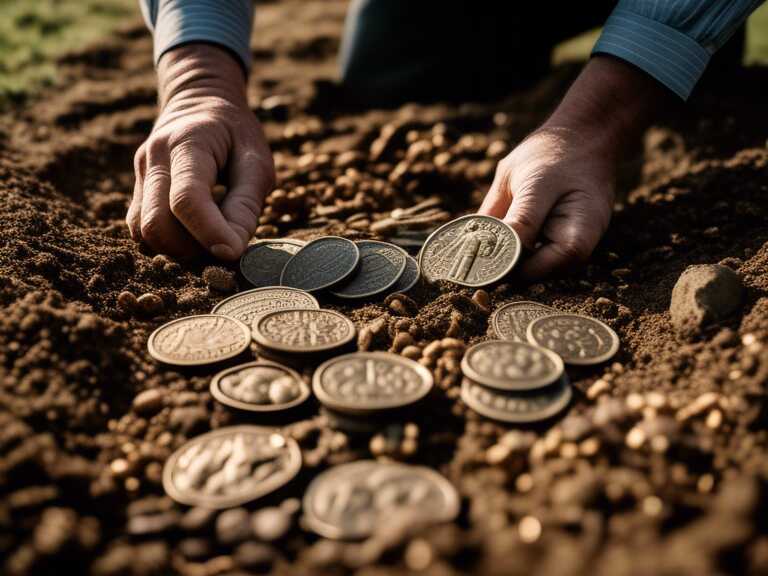
British Man Strikes Gold with $176,000 Ancient Roman Coin Discovery in Suffolk Field
A British man discovered ancient Roman coins worth $176,000. The treasure, found in Suffolk, England, may have been buried by a soldier.

A British man unearthed an impressive trove of ancient Roman gold and silver coins whilst metal detecting, leading to an auction that fetched a staggering $176,000. The treasure was found by George Ridgway, a trained archaeologist, in a uniquely marked field in Suffolk, England, in September 2019. This discovery not only honored the rich Roman history of the area but also fattened Ridgway's pocket with modern currency.
Discovery of the Trove
According to a release from Noonans Auctions, George Ridgway was drawn to an unusual marking in the field. His knowledge of a nearby Roman road had him thinking there might be more to the area than meets the eye. After hours of searching yielded nothing, Ridgway decided to shift his position by just 30 yards. This seemingly small change proved pivotal as it led to the discovery of two Roman brooches dating back to the 1st century and a silver coin bearing Julius Caesar's figure from 46 BC.
However, the search was just getting started. Another three hours of dedicated scouring revealed 160 additional silver coins and some pottery fragments. Recognizing the historical significance of the find, Ridgway immediately called his father to secure the site overnight in anticipation of the arriving archaeological team. Excavation of the site proceeded for three months, revealing an astounding total of 748 coins, with findings dating back as early as 206 B.C.
Significance of the Unearthed Coins
According to Alice Cullen, a coin specialist at Noonans Auctions, the cache is one of the largest finds of Iron Age and Roman coins in the United Kingdom. Furthermore, Cullen speculated that the coins likely belonged to a long-serving soldier in Rome's XX Legion, previously stationed in what would later become Colchester, England. This assumption is supported by the historical context of a fierce battle that took place in the vicinity around 47 A.D., amidst which the coins might have been buried. In a twist of poetic justice, a victim of the conflict might inadvertently be the one who concealed the coins, safeguarding them through time.
Upon validifying the significance of the find, 63 of the coins were claimed for display by the British Museum and the Colchester & Ipswich Museum. The remaining coins were subject to an auction, which far surpassed expectations. Unlike the anticipated revenue of approximately $100,000, the auction amassed more than $176,000, as reported by BBC via CBS News partner. Among the standout sales was a coin, adorned with the image of Empress Agrippina, issued by Gaius Caesar (Caligula), which sold for around $9,295. Another, issued by Claudius, fetched about $6,640, adding to the overall financial glory of the auction.
The Financial Windfall
For George Ridgway, the financial windfall from the auction has been life-altering. The proceeds will be shared between Ridgway and the landowner of the site where the coins were discovered. Ridgway expressed his surreal experience, likening it to a dream come true. Drawing inspiration from his childhood hero, Indiana Jones, and the spark ignited by a metal detector gift from his grandmother, Ridgway's dedication to history hunting has culminated in this awe-inspiring discovery.
Reflecting on the Legacy
The unearthing of such a significant historical artifact not only unveils a fragment of the past but also underscores the value of dedicated exploration and preservation of history.This story serves as a reminder of the age-old allure of exploration and the stories that lie hidden beneath the soil, waiting for an inquisitive mind to bring them back to life.
Share news















